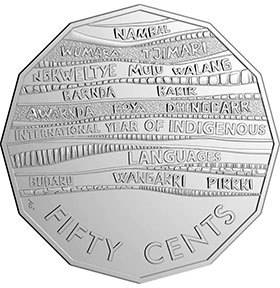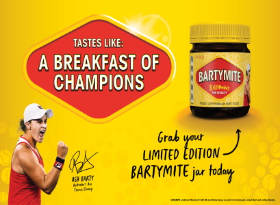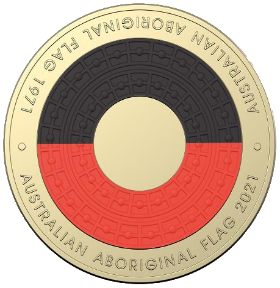Aboriginal timeline: Recognition
Found 76 results for your search. Showing page 3 of 4.
2019
-
The Uniting Church of Australia holds the first "Day of Mourning" (each Sunday before Australia Day). Congregations nationwide should "acknowledge the dispossession, violence and murder of First Peoples, lament the fact that as a Church and as Second Peoples we were and remain complicit", reflect on the effect of invasion and colonisation and honour Australia’s First Peoples. [1]
-
The ACT government "recognises Aboriginal and Torres Strait Islander peoples as Australia's first people" in its Aboriginal and Torres Strait Islander Agreement 2019–2028. It also recognises First Nations peoples right to self-determination and the importance of land. The Agreement sets a ten-year direction for the government's handling of First Nations affairs in four "core areas" and six "significant areas" of work. This agreement builds on the previous 2015 agreement.
-

The Royal Australian Mint issues a 50 cents coin to commemorate the International Year of Indigenous Languages. The Royal Australian Mint issues a new 50 cents coin that shows the word "money" in 14 Aboriginal languages, a tribute to the International Year of Indigenous Languages. As there hasn't been a traditional Aboriginal word for "money", new words were used often related the look and feel of coins: piece, pebble, stone, rock, grey.
-
The Australian Capital Territory (ACT) government establishes the ACT Aboriginal and Torres Strait Islander agreement 2019–2028 which sets long-term aspirations for improving social, environmental, economic and cultural infrastructure in communities and acknowledges the right to self-determination. Its delivery action plan sets out ten focus areas: children and young people, community leadership, cultural integrity, inclusive community, justice, connecting the community, economic participation, health and wellbeing, housing, and life long learning. The previous agreement ran from 2015–18.
-
The International Council on Monuments and Sites, which works for the conservation and protection of cultural heritage places around the world, officially recommends world heritage status for the Budj Bim cultural landscape, a 6,600-year-old, highly sophisticated aquaculture system developed by the Gunditjmara people in south-west Victoria. If successful, it would become the first Australian site listed exclusively for its Aboriginal cultural value.
-
After a 17-year campaign, the Budj Bim Cultural Landscape near Portland, a 6,600-year-old Aboriginal aquaculture site in south-west Victoria, is added to the UNESCO World Heritage List. Older than the pyramids, the site proves that Aboriginal people built channels and pools to harvest eels, and also permanent stone houses. The site is considered one of the largest and oldest aquaculture sites in the world and became the first Australian World Heritage site to be nominated exclusively for Aboriginal cultural values.
-
Dujuan, a 12-year-old Arrernte/Garrwa boy from central Australia, speaks at the UN Human Rights Council demanding the Australian government to stop sending 10-year-old children to to prison and support Aboriginal-led education models. All Australian states and territories allow 10-year-old children to be arrested, charged and sent to prison. Raising the age of criminal responsibility from 10 to 14 would bring Australian standards into line with international law. [2]
-

In celebration of Ash Barty's win, Bega, manufacturer of Vegemite, renamed its product temporarily to 'Bartymite'. Ngaragu woman Ash Barty wins the Women's Tennis Association (WTA) Finals in Shenzhen, China, becoming the first Australian woman to win the season-ending tournament since Evonne Goolagong Cawley won the crown for a second time in 1976. She is also the first Australian woman since rankings were introduced in 1973 to finish the year as world number one. Her A$6.4 million prize packet is the biggest winner's cheque in tennis history. In celebration, Barty's sponsor Vegemite released a limited edition called "Bartymite" – only the the second time in Vegemite's history that the name had been changed, and the first time with an individual's name. [3]
2020
-
Ngaragu woman Ash Barty is named Young Australian of the Year 2020. She is recognised for inspiring many Aboriginal peoples not only in her role as a National Indigenous Tennis Ambassador for Tennis Australia or her sporting career but in her down-to-earth, kind-hearted personality and resilience.
-
The Royal Australian Navy appoints its first permanent Aboriginal adviser. The role is taken by Muluridji man Lieutenant Commander Samuel Sheppard who has served the navy for more than 20 years.
-
TV channel ABC's Insiders program features its first-ever Aboriginal panellist with Yorta Yorta and Dja Dja Wurrung woman Bridget Brennan. [4] The program debuted in July 2001.
-
Australian cheese manufacturer Saputo announces after reviewing a "sensitive situation" that it will retire the brand name 'Coon' because of its "responsibility to eliminate racism in all its forms". The decision comes after many years of campaigning by Aboriginal activists.
-
18-year-old photographer Yolngu woman Siena Mayutu Wurmarri Stubbs from Arnhem Land becomes one of the youngest winners in the 37-year history of the National Aboriginal and Torres Strait Islander Art Awards, Australia's most prestigious Aboriginal art awards. She wins the multimedia category with a poetry and video artwork she filmed while on a bullet train in Japan.
-
Wongutha-Yamatji man and first-time Archibald Prize entrant Meyne Wyatt wins the 2020 Packing Room Prize with his self portrait, titled Meyne. It is the first time an Aboriginal artist has won any of the awards in the Archibald prize's history. (The Packing Room Prize is judged by gallery staff who receive, unpack and hang the entries submitted to the Archibald prize.)
-
APY man Vincent Namatjira, great-grandson of renown artist Albert Namatjira, wins the Archibald prize with a portrait of himself and AFL legend Adam Goodes titled Stand Strong for Who You Are and becomes the first Aboriginal artist to win the prize in its almost 100-year history.
Indigenous art isn't just dot paintings ... We do everything – music, film, photography, contemporary art. We do it all, and we do it really well.
— Vincent Namatjira [5] -

A two-dollar coin commemorating the 50th anniversary of the Aboriginal flag. The Royal Australian Mint (RAM) issues a 6-coin 2021 year set that commemorates the 50th anniversary of the Australian Aboriginal flag. The set includes a collector version of the coloured two dollar coin produced for circulation in 2021 (possibly around the 12 July) to commemorate the anniversary.
The coin represents the flag with black and red fields printed over a relief pattern of miniature flags. The centre of the coin is not printed so that the gold of the coin’s alloy shines through, acting as the yellow colour representing the sun.
It's the first time the RAM includes a coloured 2-dollar coin in a year set of coins.
-
After Gomeroi woman Rachael McPhail campaigned for Aboriginal place names to be included in postal addresses, Australia Post updated their addressing guidelines "to educate customers on how they can include Traditional Place names in addresses as a way of acknowledging the traditional custodians of the land an item is being sent from or delivered to". Other courier companies follow their example. [6]
-
Archie Roach is inducted into the Hall of Fame at the 2020 Australian Recording Industry Association (ARIA) Music Awards. He also wins Best Male Artist and Best Adult Contemporary Album for Tell Me Why.
-
For the first time at an international sports event in Australia, the Australian anthem was sung in an Aboriginal language. Olivia Fox, a 17-year-old Wiradjuri woman and student at Newtown High School of the Performing Arts, sang the national anthem in the Eora language at a rugby game (Wallabies vs Los Pumas from Argentina).
2021
-
Prime Minister Scott Morrison changes the words of the national anthem. The second line of the national song is now "for we are one and free" instead of "young and free". The change recognises Australia's long Aboriginal history but also the waves of migration and how Australians have united in times of crisis. However, the PM did not consult with Aboriginal people. NSW Premier Gladys Berejiklian had raised the idea for the wording change about a year ago. It is the first change to the anthem since 1984.
Australia as a modern nation may be relatively young, but our country’s story is ancient, as are the stories of the many First Nations peoples.
— Scott Morrison, Prime Minister [7]
References
View article sources (0)
[17411] 'Uniting Churches to observe Day of Mourning', Insights magazine of the Uniting Church, 9/1/2019
[72280] 'Aboriginal child to address UN Human Rights Council and urge Australia to stop sending 10 year olds to prison', Human Rights Law Centre 9/9/2019
[77480] 'Bega times 'Bartymite' branding stroke to perfection', SMH 4/11/2019
[113941] 'ABC’s Insiders: Host forced to admit its failure to include Indigenous voices', News.com.au 14/6/2020
[146807] ''It took 99 years': Vincent Namatjira wins Archibald prize', SMH 26/9/2020
[120949] 'Acknowledging Traditional Place names in addresses', Australia Post, media release, 17/11/2020, available at ourpost.com.au/news/latest-news/acknowledging-traditional-place-names-in-addresses
[124214] 'Now is the time to recognise that Australia is 'one and free'', SMH 31/12/2020


